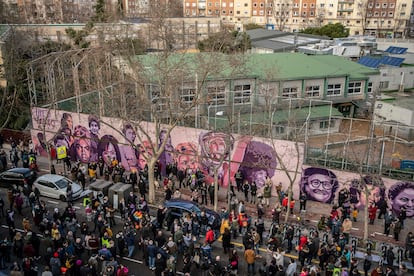Madrid feminist mural saved from far right’s plans for destruction
Vox city councilors wanted the work to be replaced with one related to sport, arguing that the design, which honors women such as Rosa Parks and Nina Simone, contained a “political message”

A feminist mural in Madrid has been spared from destruction after the center-right party Ciudadanos (Citizens) voted against plans for its removal in a surprise move.
The far-right party Vox had called for the mural in the Madrid neighborhood of Ciudad Lineal to be removed and replaced with another representing five male and five female paralympic athletes. The current work, which is painted on the walls of La Concepción sports facility, pays homage to the achievements of 15 pioneering women, including Nina Simone, Rosa Parks, Frida Khalo and Emma Goldman.
The mural was created in 2018, when Madrid City Hall was governed by former mayor Manuela Carmena from the leftist Ahora Madrid (later renamed as Más Madrid). The public was invited to choose between two designs and voted in favor of the current mural “Unity makes strength,” which celebrates women “who have overcome challenges, broken barriers and become reference points in the defense of women and equality,” according to the project’s description.

At the time, neither the conservative Popular Party (PP) or Ciudadanos objected to the mural. But four years later the situation has changed. Madrid City Hall is now governed by a coalition of the PP and Ciudadanos, with the support of Vox. Without the far-right party’s votes, the coalition would not have been able to take office following the inconclusive results of the 2019 municipal elections.
Last Thursday, Vox filed a motion to have the mural removed on the grounds that it contained a “political message.” The move sparked a fierce backlash: dozens of residents from the Ciudad Lineal district gathered outside the mural on Sunday to protest the decision, and an online petition against the removal received more than 56,000 signatures.
“The message of the mural is ‘ability doesn’t depend on gender,’ I can’t imagine who would find that offensive,” said Carlos Estévan, a 50-year-old resident of Ciudad Lineal, who was at Sunday’s protest.
Despite the criticism, Madrid Mayor José Luis Martínez Almeida, of the PP, defended the plans to remove the mural, arguing last Friday that the proposed design of male and female paralympic athletes represented feminism “even better,” “because feminism is equality between men and women.”
The message of the mural is ‘ability doesn’t depend on gender,’ I can’t imagine who would find that offensiveCarlos Estévan, resident of Ciudad Lineal who protested against plans to remove the mural
But Ciudadanos – after supporting Vox’s motion – did a U-turn on Tuesday and supported an urgent motion brought by Más Madrid and the Socialist Party (PSOE) to stop the mural’s removal.
“You can call it rectification. I don’t care,” said Begoña Villacís, the deputy mayor of Madrid. The Ciudadanos leader criticized the left for promoting “a sectarian and exclusive feminism,” but said: “I am not in favor of removing murals [...] Sectarianism is not fought with sectarianism.”
This is not the first time Madrid City Hall has locked horns with Vox. Last year, Madrid Mayor Almeida got into a heated exchange with Vox representatives when they refused to observe a minute of silence in memory of a victim of gender violence in Madrid. Ciudadanos also fought Vox’s plans for a so-called “parental veto” – a policy that gives parents the right to stop their children from attending complimentary workshops on LGBTQI rights – but later paved into the party’s demands.
Vox entered parliament for the first time in the Andalusian regional elections in 2018, and since then, has gained significant ground in all levels of government. As well as holding the third-largest number of seats in Spain’s lower house of parliament, the Congress of Deputies, the far-right party is also a key player in numerous regional and municipal governments. Vox has used this position to push a more conservative agenda, particularly with respect to gender equality and LGBTI rights. The far-right group blocked regional and local governments from issuing institutional declarations against gender violence, forced the Andalusian administration to replace the term “gender violence” with “family violence” on the grounds that it discriminated against men, and has made repeated calls for Spain’s gender violence law to be repealed.
English version by Melissa Kitson.
Tu suscripción se está usando en otro dispositivo
¿Quieres añadir otro usuario a tu suscripción?
Si continúas leyendo en este dispositivo, no se podrá leer en el otro.
FlechaTu suscripción se está usando en otro dispositivo y solo puedes acceder a EL PAÍS desde un dispositivo a la vez.
Si quieres compartir tu cuenta, cambia tu suscripción a la modalidad Premium, así podrás añadir otro usuario. Cada uno accederá con su propia cuenta de email, lo que os permitirá personalizar vuestra experiencia en EL PAÍS.
¿Tienes una suscripción de empresa? Accede aquí para contratar más cuentas.
En el caso de no saber quién está usando tu cuenta, te recomendamos cambiar tu contraseña aquí.
Si decides continuar compartiendo tu cuenta, este mensaje se mostrará en tu dispositivo y en el de la otra persona que está usando tu cuenta de forma indefinida, afectando a tu experiencia de lectura. Puedes consultar aquí los términos y condiciones de la suscripción digital.









































